|
|
|
Sort Order |
|
|
|
Items / Page
|
|
|
|
|
|
|
| Srl | Item |
| 1 |
ID:
166758
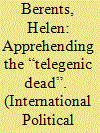

|
|
|
|
|
| Summary/Abstract |
Images of suffering children have long been used to illustrate the violence and horror of conflict. In recent years, it is images of dead children that have garnered attention from media audiences around the world. In response to the deaths of four children killed by the Israeli army while playing on a Gazan beach, Israeli Prime Minister Netenyahu accused Hamas of generating “telegenically dead” Palestinian children for their cause (CNN 2014). In this article, it argues with this term to consider the appearance of images of dead children in global politics. I draw on a growing literature relating to the corpse as a subject in international relations (IR), asking how children's bodies are understood, following Butler, as “grievable lives.” It explores the notion of “iconic” images and the politics of sharing images of dead bodies and consider global power relations that allow certain children's deaths to be visible and not others. Through this analysis, the article argues that the idea of telegenic death might be productively considered to understand how the fleshy reality of children's deaths contribute to discussions about the representation and visibility of children in contexts of crisis and conflict.
|
|
|
|
|
|
|
|
|
|
|
|
|
|
|
|
| 2 |
ID:
166760
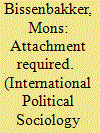

|
|
|
|
|
| Summary/Abstract |
Taking as its case the Danish “attachment requirement” (2000–2018), this article examines the way in which the biopolitical management of marriage migration has come to take the form of asserting national belonging. Although introduced as a tool for combatting “forced marriages,” the Danish attachment requirement did not purport to determinate the genuine character of love relationships but instead aimed at monitoring and predicting the national attachment of migrating spouses. Through an in-depth analysis of Danish Alien Acts from 2000 to 2018, I demonstrate how the attachment requirement placed an obligation on the applicants to orient themselves toward the Danish nation and society as opposed to other nations, symbolically and legally represented by the applicants’ next of kin and/or their relation to the so-called “ghetto.” Relying on the affective-phenomenological concept of orientation, I suggest that national attachment according to the Danish Aliens Act can be understood as a method for turning belonging into a juridical tool. This secures maximum flexibility for the state in bestowing and reworking rights to family reunification.
|
|
|
|
|
|
|
|
|
|
|
|
|
|
|
|
| 3 |
ID:
166757
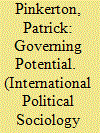

|
|
|
|
|
| Summary/Abstract |
Many scholars of international political sociology have turned to biopolitics in their attempts to understand the “European migration/refugee crisis” that has unfolded in and around the Mediterranean Sea in the last several years. This article makes an intervention into this debate by suggesting a new means of understanding the biopolitics of migration and refugee management, based on a detailed consideration of the role of potentiality in biopolitical governance. After first discussing current understandings of potentiality within biopolitical literatures, and the analyses of migration and refugee governance they suggest, the article engages in a reading of Agamben's recent work The Use of Bodies, in order to develop a new understanding of life's potential within biopolitical logics as potential toward the “correct use” of bodies. This allows for a focus on biopolitical practices of incorporation and inclusion which goes beyond analyses of the acts of securitization or abandonment that only partially characterize reactions to the movement of people across the Mediterranean Sea. This understanding is employed to provide fresh insights into one of the defining responses to the “European migration/refugee crisis”: the “open-door” migration and refugee policy pursued by the German government under Chancellor Angela Merkel from the summer of 2015 onward.
|
|
|
|
|
|
|
|
|
|
|
|
|
|
|
|
| 4 |
ID:
166762
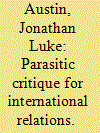

|
|
|
|
|
| Summary/Abstract |
This paper introduces the concept of a “parasitic critique.” It begins by theorizing the ethico-political positionality of “critical” researchers by speaking with Michel Serres to introduce the figure of the parasitic-researcher. That device explores a tension in critical research between hearing “thick” descriptions of our interlocutors’ lifeworlds before channeling them into “thin” metatheoretical accounts. The paper argues that this dilemma relates to the rhetorical “style” of critical approaches in IR, which employ a certain “suspicious hermeneutics” that is unwilling to take seriously the voices of particular interlocutors. By contrast, a parasitic critique is laid out as a critical orientating sensibility focused on reordering the methods of critique, with the hope of cultivating a non-judgmental ethic of “care-full” analysis and description. This argument is made by drawing out one “lay” critical theory of political violence that sees critique make a three-fold switch from suspicion to learning, exclusion to combination, and contradiction to composition. Throughout, these claims are nested within self-reflections on work interviewing both victims and perpetrators of torture, which demonstrate—often uncomfortably—how it is necessary to find points of critical sympathy between the subjugator and the subjugated that can be leveraged for the ethico-political good.
|
|
|
|
|
|
|
|
|
|
|
|
|
|
|
|
| 5 |
ID:
166759


|
|
|
|
|
| Summary/Abstract |
Drawing from alternative views on (African) statehood via the notion of “mimicry” in [post]colonial settings, this article investigates the transformational dynamics of routinized micro-interactions between street-level bureaucrats and ordinary citizens in Kinshasa, Lubumbashi, and Goma. It is argued that while conventional analyses of “state weakness” may construe the Congolese state as needing better imitation of the western registers of modernity, ethnographic and historical explorations of state-society interactions in the Congo reveal a different story. In particular, it will be shown that the various forms of “state-mimicry” at work in the Congo result in fact—via the “state effect”—in a local “hyperreality” of the Congolese state in which “copy” and “model” entertain an ambivalent but constitutive relationship.
|
|
|
|
|
|
|
|
|
|
|
|
|
|
|
|
| 6 |
ID:
166756
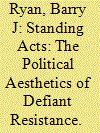

|
|
|
|
|
| Summary/Abstract |
We most commonly encounter the word defiance when used as an adverb to classify a peculiarly courageous or risky act of resistance. However, the use of the word defiance in this way is a departure from the historical meaning of the word. Moreover, it occludes the possibility that there exists political activity that is manifestly defiant. The article takes issue with this tendency and identifies a mode of resistance that is explicitly defiant. In order to do this, the paper draws from the phenomenological approach underpinning the standing sculptures of the British sculptor Antony Gormley. This informs an exploration of the protest enacted by the standing man of Taksim Square, who participated in a large antigovernment movement in Turkey in 2013. In acts we might distinguish as defiant, the paper demonstrates the materialist vulnerability of the protesting body, the aesthetic ontology at work, the prevalence of the standing metaphor, the role of silence, and the absence of futurity. By unearthing defiant modes of protest, the heterogeneity of resistance is affirmed, and a new domain where art encounters the political is revealed.
|
|
|
|
|
|
|
|
|
|
|
|
|
|
|
|
| 7 |
ID:
166761


|
|
|
|
|
| Summary/Abstract |
In many ways the “practice turn” in international relations (IR) was a mere “practices turn,” in that it essentially sidelined what were presumably two key inspirations of this “turn,” namely the philosophy of Ludwig Wittgenstein and American pragmatism. This article argues that—despite obvious differences—Wittgenstein and pragmatism share a general commitment to the primacy of practice and the constitution of meaningful action in language that reaches well beyond the ongoing fixation on “practices” (as habits) in IR. We argue that a combination of the central insights of both Wittgensteinian and pragmatist works offers a fruitful new perspective on the long-standing debate about whether the idea and practice of social science differ from other scientific disciplines, in particular natural science, in (a) the relation to its subject matter, (b) the methodology it applies, and (c) the role of theory. A reassessment of this debate will also broaden our understanding of the practice of IR theorizing that not only comprehends it as the mere habitual or routinized endeavor of social scientists bound to their specific method of science but also emphasizes the creative momentum of theorizing as a linguistic practice vis-à-vis its subject matter.
|
|
|
|
|
|
|
|
|
|
|
|
|
|
|
|
|
|
|
|
|